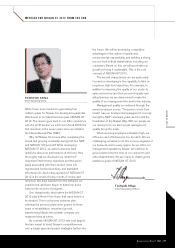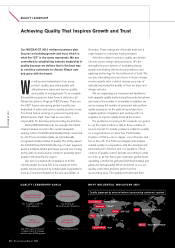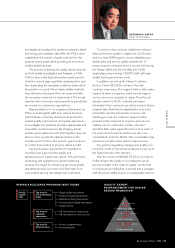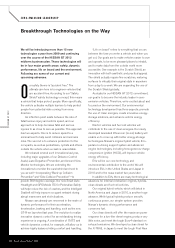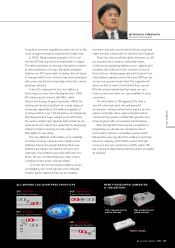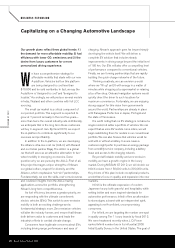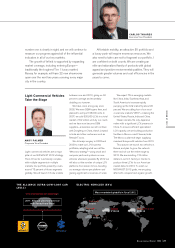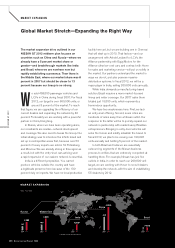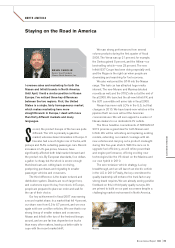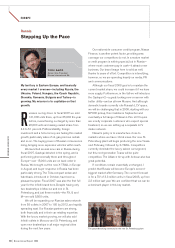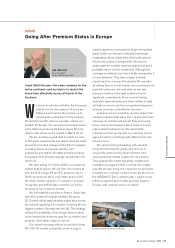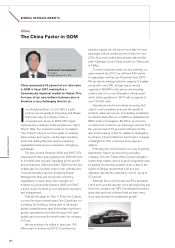Nissan 2008 Annual Report Download - page 31
Download and view the complete annual report
Please find page 31 of the 2008 Nissan annual report below. You can navigate through the pages in the report by either clicking on the pages listed below, or by using the keyword search tool below to find specific information within the annual report.
MARKET EXPANSION: INDIA
Supplier: Maruti Suzuki
Scope: A-segment vehicles
Start of sales: 2009
OEM (Export to Europe)
Partner: Hover
Scope: M&S operations
M&S Partner
Partner: Bajaj, Renault
Scope: Alliance Ultra-Low-Cost Car
Start of production: 2011
Alliance Ultra-Low-Cost Car
Partner: Renault
Start of production: 2010
PV Manufacturing
Partner: Ashok Leyland
Start of production: 2010
LCV
Partner: Renault
From 2008
R&D Captive Center
Delhi
Mumbai
Chakan
Chennai
29
Nissan Annual Report 2008
NISSAN GT 2012
COLIN DODGE
Senior Vice President
The issues we have in the Middle East revolve
around our distribution system and network quality.
We already have the right products, and simply need
to market them more effectively. By fiscal 2012,
we expect to double sales here to more than
400,000 units.
Entry-level vehicles are in huge demand
everywhere, and the three A-platform vehicles will
be one of our answers for all markets. We will be
producing in five countries, including India and
Thailand. In India, customers who cannot afford an A-
platform vehicle will find the Alliance ultra-low-cost
car an attractive and affordable alternative.
To find the right network partners, we use an
evaluation system that measures performance
against a set of sophisticated KPIs and criteria that
distill the attributes of superior dealers and sales
companies. We are inviting those top-rated
performers to expand either geographically or within
their own markets. Some of our Infiniti dealers in
Europe, for example, come from the Middle East,
and will become our partners in the Gulf region.
Many of these hot markets do pose risks. In India,
for example, the primary hazard is the
infrastructure—power utilities, the roads and rail
system. There are simply not enough roads to run the
cars on. In Brazil, the boom-and-bust nature of
economic growth is the worry. Gas, oil and capitalism
are fueling Russia, but the eastern half of the country
is progressing at a much slower pace than the
St. Petersburg and Moscow areas.
Fortunately I anticipate no risk in China as long
as we offer high-quality products and good value.
And in the Middle East, the only impediment is our
ability to supply the right product at the right time.
The Alliance is vital to these expansion efforts in
several respects. We will invest in our new passenger
vehicle plant in Chennai on an equal basis with
Renault, which immediately reduces our fixed costs
and infrastructure expenditures, and keeps us from
spreading our resources too thin. Renault’s diesel
engine is also very competitive and gives us
a powerful alternative to our gas engines. We share
a plant in Brazil, where Renault is bigger and better
established than Nissan. Our new Alliance-led
partnership with Avtovaz in Russia—a company with
thirty years of local market experience—should also
prove invaluable.
With the exception of Renault-Nissan, the auto
industry is littered with failed alliances that have lost
millions and billions of dollars in value. Only the
Alliance has actually created value. We maintain a
healthy sense of individuality and corporate
autonomy, yet we enjoy virtually the same synergies
a completely integrated company would.
We have a knack for making durable, profitable
partnerships with strong companies. Nissan now has
a reliable history of localizing management, staying
flexible and understanding local culture and needs.
We have learnt that an arrogant and dictatorial
approach destroys value and relationships. This is
one reason we believe our drive to expand globally
will be successful.




